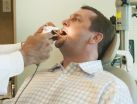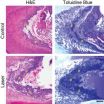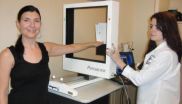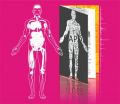(Press-News.org) Clinical guidelines conflict on testing teens and adults whose symptoms point to a possible strep throat. A chief contention is whether negative tests results from a rapid analysis of a throat swab, done in a doctor's office, should be confirmed through a follow-up laboratory culture.
The rapid test detects certain antigens, one of the body's efforts to fight off strep bacteria. Attempting to grow bacteria from a throat specimen double checks for the presence or absence of Group A Streptococcus bacteria, as well as a few other bacterial infections.
A study published May 27 in Clinical Infectious Diseases indicates that performing a laboratory culture could help doctors and patients avoid both under-treating and over-treating sore throats.
Several guidelines on diagnosing and treating Group A Streptococcus sore throats in adults have been published by medical and scientific professional societies, including the College of American Pathologists and the Infectious Diseases Society of America.
The study findings call into serious question clinical guidelines that rely only on the rapid test, according to Dr. Ferric Fang, professor of microbiology and laboratory medicine at the University of Washington, and senior author of the paper.
Fang said, "Each year nearly seven million Americans seek medical attention for a sore throat, making it one of the most common reasons to see a doctor."
About one in 10 of these patients has a strep throat. The rest are due to viruses or other causes. Although most cases of strep throat heal on their own, antibiotic treatment reduce symptoms decrease transmission to others, and can prevent rare but serious complications such as damage to heart valves.
Accurately diagnosing that the sore throat is not bacterial is also important, Fang said. Antibiotics for a strep throat don't work against a viral sore throat, and can produce harmful side effects not outweighed by benefits. Unnecessary use of antibiotics also contributes to antibiotic-resistance.
Fang explained that rapid tests, while convenient, miss up to 1 out of 4 cases of strep throat. Some physicians will recommend a throat culture even when the rapid test is negative, if the patient's symptoms seem to warrant it.
Doctors check a patient with a suspected strep throat for tender glands in the neck below the ears, lack of a cough, difficulty opening the jaw, painful swallowing; oozing, swollen, tonsils; fever and a high white blood cell count.
Despite the constellation of suspicious symptoms in the Centor score for strep throat likelihood, it is still difficult to distinguish a viral sore throat from a strep throat. However, if doctors depend simply on symptom presentation to diagnose, without any testing, the tendency is to over-prescribed antibiotics. Doctors who rely just on the rapid test may end up undertreating strep throat.
The controversy on diagnosing strep throat prompted Fang and his UW colleagues, Dr. Tanis Dingle, senior fellow in laboratory medicine, and Dr. April Abbot, assistant professor of laboratory medicine and director of clinical microbiology at UW Medicine, to review the anonymous records of more than 25,000 teens and adults seen for sore throats at Harborview Medical Center and University of Washington Medical Center in Seattle. The records went back 11 years. The researchers found that more than 1,000 patients whose rapid throat cultures were negative actually turned out to have strep in their laboratory throat cultures.
"These cases would have been undetected if their doctors hadn't performed cultures," Fang said.
Most of these patients had moderate to severe symptoms; a very few had serious complications such as a tonsil abscess or rheumatic fever. Most of the patients were given antibiotics. The throat cultures, Fang said, helped guide treatment decisions in half of the cases.
From their results, the researchers extrapolated that, each year in the United States more than 250,000 patients with strep throat would not receive beneficial treatment if doctors followed those clinical guidelines that advise relying on the rapid test alone. The findings support those guidelines that mandate back-up lab cultures.
The researchers concluded, "Appropriate use of rapid and culture-based diagnostic tests can reduce inappropriate use of antibiotics for sore throats, while avoiding under-treatment of patients who can benefit from antibiotics."
INFORMATION:
Suspect strep throat? Re-check negative rapid test results with lab culture
Accurate diagnosis essential for appropriate use of antibiotics
2014-05-28
ELSE PRESS RELEASES FROM THIS DATE:
Negative social interactions increase hypertension risk in older adults
2014-05-28
PITTSBURGH—Keeping your friends close and your enemies closer may not be the best advice if you are 50 or older.
New research from Carnegie Mellon University's Rodlescia Sneed and Sheldon Cohen shows that unpleasant or demanding interpersonal encounters increase hypertension risk among older adults.
Published in the American Psychological Association's journal Health Psychology, the study provides some of the first concrete evidence that negative social interactions not only influence psychological well-being but also physical health – in this case, blood pressure ...
T cell repertoire changes predictive of anti-CTLA-4 cancer immunotherapy outcome revealed
2014-05-28
Sequenta, Inc. today announced publication of a study done in collaboration with researchers from UCSF and UCLA that used the company's proprietary LymphoSIGHT™ immune repertoire sequencing platform to investigate the effects of anti-CTLA-4 antibody on the number and types of T cells present in a patient's blood. The results, which appear in the May 28 issue of Science Translational Medicine, shed light on the mechanism of action of this type of cancer immunotherapy and suggest that immune repertoire sequencing could be used to predict which patients will have improved ...
Study: Amphetamines can delay exhaustion during exercise in the heat -- at a cost
2014-05-28
Indiana University researchers put male rats to the test to determine the role amphetamines play when used in conjunction with exercise.
When people or animals exercise in the heat, exhaustion is a safety gauge telling the body it is time to stop. Exhaustion occurs when the body's core temperature reaches a potentially dangerous point. The use of amphetamines is banned in many sports because they increase time to exhaustion.
What they found: Amphetamines can delay exhaustion during exercise in the heat by increasing the temperature at which it occurs. This potentially ...
Researchers use light to coax stem cells to repair teeth
2014-05-28
A Harvard-led team is the first to demonstrate the ability to use low-power light to trigger stem cells inside the body to regenerate tissue, an advance they reported in Science Translational Medicine. The research, led by Wyss Institute Core Faculty member David Mooney, Ph.D., lays the foundation for a host of clinical applications in restorative dentistry and regenerative medicine more broadly, such as wound healing, bone regeneration, and more.
The team used a low-power laser to trigger human dental stem cells to form dentin, the hard tissue that is similar to bone ...
EARTH magazine: The history, science and poetry of New England's stone walls
2014-05-28
Alexandria, Va. — When author John-Manuel Andriote returned to his hometown in New England after years away, he noticed something that had been invisible to him while growing up there — the old stone walls tumbling off into the forests. The realization that the crumbling and overgrown walls meant those forests had once been cleared farm lands set Andriote on a years-long journey of discovery that highlights the intersections of geologic and human history.
The story of New England's stone walls begins with the glaciers of the last ice age, meanders through the Colonial ...
Some high blood pressure drugs may be associated with increased risk of vision-threatening disease
2014-05-28
SAN FRANCISCO – May 28, 2014 – There may be a connection between taking vasodilators and developing early-stage age-related macular degeneration (AMD), the leading cause of vision loss and blindness among Americans who are age 65 and older, according to a study published online in Ophthalmology, the journal of the American Academy of Ophthalmology.
AMD – the deterioration of the eye's macula, which is responsible for the ability to see fine details clearly – affects an estimated 11 million people in the United States. In addition to increased age, the cause of AMD ...
NYU researchers pilot educational and behavioral program to reduce lymphedema risk
2014-05-28
Viewed as one of the most unfortunate outcomes of breast cancer treatment, lymphedema is characterized by an accumulation of lymph fluid in the interstitial spaces of the affected limb, leading to chronic ipsilateral limb swelling causing psychosocial distress and physical challenges for patients.
Even conservative estimates suggest that 3% of women who have had sentinel lymph node biopsy and 20% of those who have had axillary lymph node dissection may develop lymphedema a year after breast cancer surgery. Two established risk factors for lymphedema are compromised ...
A cure for dry eye could be a blink away
2014-05-28
A treatment for dry eye—a burning, gritty condition that can impair vision and damage the cornea—could some day result from computer simulations that map the way tears move across the surface of the eye.
Kara Maki, assistant professor in Rochester Institute of Technology's School of Mathematical Sciences, contributed to a recent National Science Foundation study seeking to understand the basic motion of tear film traversing the eye. "Tear Film Dynamic with Evaporation, Wetting and Time Dependent Flux boundary Condition on an Eye-shaped Domain," published in the journal ...
Antarctic ice-sheet less stable than previously assumed
2014-05-28
The first evidence for massive and abrupt iceberg calving in Antarctica, dating back 19,000 to 9,000 years ago, has now been documented by an international team of geologists and climate scientists. Their findings are based on analysis of new, long deep sea sediment cores extracted from the region between the Falkland Islands and the Antarctic Peninsula. The study in the May 28, 2014 issue of Nature bears witness to an unstable Antarctic ice sheet that can abruptly reorganize Southern Hemisphere climate and cause rapid global sea level rise.
"One of the iceberg events ...
Filling in the gaps on the protein map
2014-05-28
By cataloging over 18,000 proteins, researchers from TUM have produced an almost complete inventory of the human proteome. This information is now freely available in the ProteomicsDB database, which is a joint development of TUM and software company SAP. The database includes information for example on the types, distribution, and abundance of proteins in various cells and tissues as well as in body fluids.
The investigations show that, on the one hand, around 10,000 proteins are concerned with housekeeping processes in many different places. On the other hand, it was ...
LAST 30 PRESS RELEASES:
Novel camel antimicrobial peptides show promise against drug-resistant bacteria
Scientists discover why we know when to stop scratching an itch
A hidden reason inner ear cells die – and what it means for preventing hearing loss
Researchers discover how tuberculosis bacteria use a “stealth” mechanism to evade the immune system
New microscopy technique lets scientists see cells in unprecedented detail and color
Sometimes less is more: Scientists rethink how to pack medicine into tiny delivery capsules
Scientists build low-cost microscope to study living cells in zero gravity
The Biophysical Journal names Denis V. Titov the 2025 Paper of the Year-Early Career Investigator awardee
Scientists show how your body senses cold—and why menthol feels cool
Scientists deliver new molecule for getting DNA into cells
Study reveals insights about brain regions linked to OCD, informing potential treatments
Does ocean saltiness influence El Niño?
2026 Young Investigators: ONR celebrates new talent tackling warfighter challenges
Genetics help explain who gets the ‘telltale tingle’ from music, art and literature
Many Americans misunderstand medical aid in dying laws
Researchers publish landmark infectious disease study in ‘Science’
New NSF award supports innovative role-playing game approach to strengthening research security in academia
Kumar named to ACMA Emerging Leaders Program for 2026
AI language models could transform aquatic environmental risk assessment
New isotope tools reveal hidden pathways reshaping the global nitrogen cycle
Study reveals how antibiotic structure controls removal from water using biochar
Why chronic pain lasts longer in women: Immune cells offer clues
Toxic exposure creates epigenetic disease risk over 20 generations
More time spent on social media linked to steroid use intentions among boys and men
New study suggests a “kick it while it’s down” approach to cancer treatment could improve cure rates
Milken Institute, Ann Theodore Foundation launch new grant to support clinical trial for potential sarcoidosis treatment
New strategies boost effectiveness of CAR-NK therapy against cancer
Study: Adolescent cannabis use linked to doubling risk of psychotic and bipolar disorders
Invisible harms: drug-related deaths spike after hurricanes and tropical storms
Adolescent cannabis use and risk of psychotic, bipolar, depressive, and anxiety disorders
[Press-News.org] Suspect strep throat? Re-check negative rapid test results with lab cultureAccurate diagnosis essential for appropriate use of antibiotics




